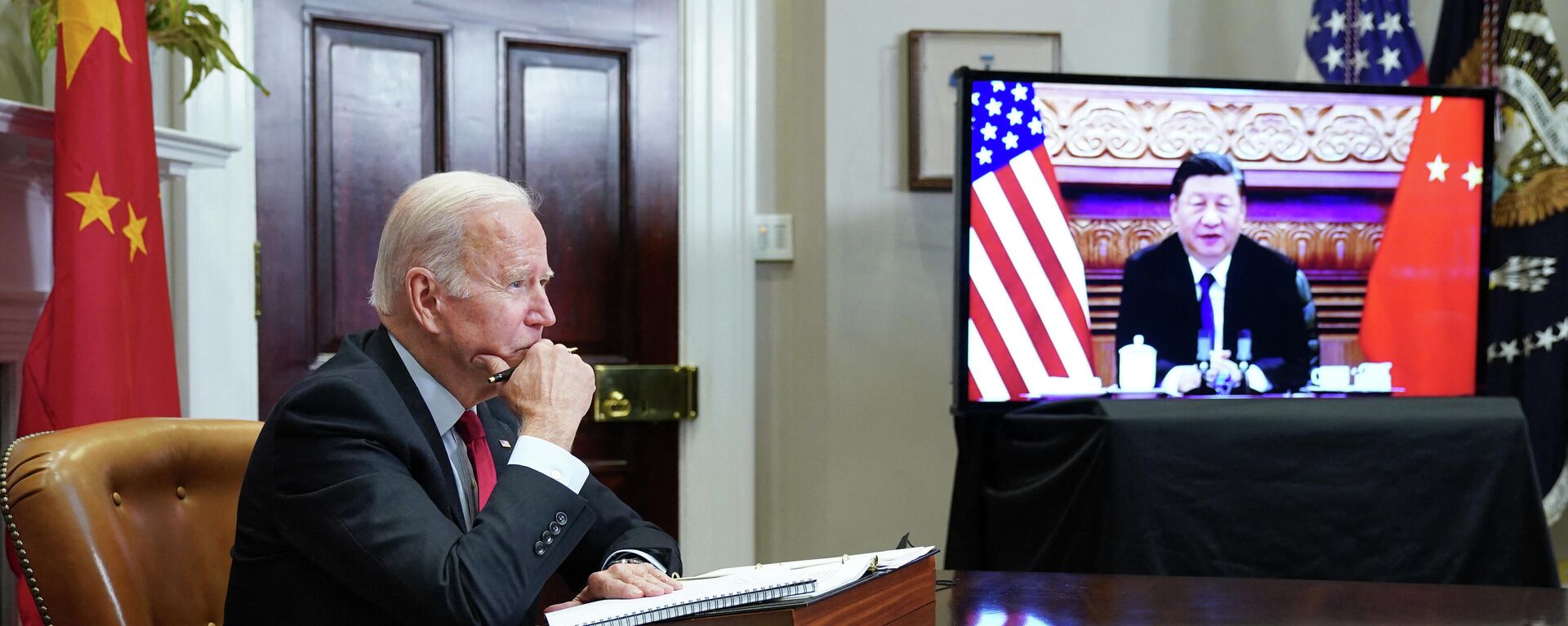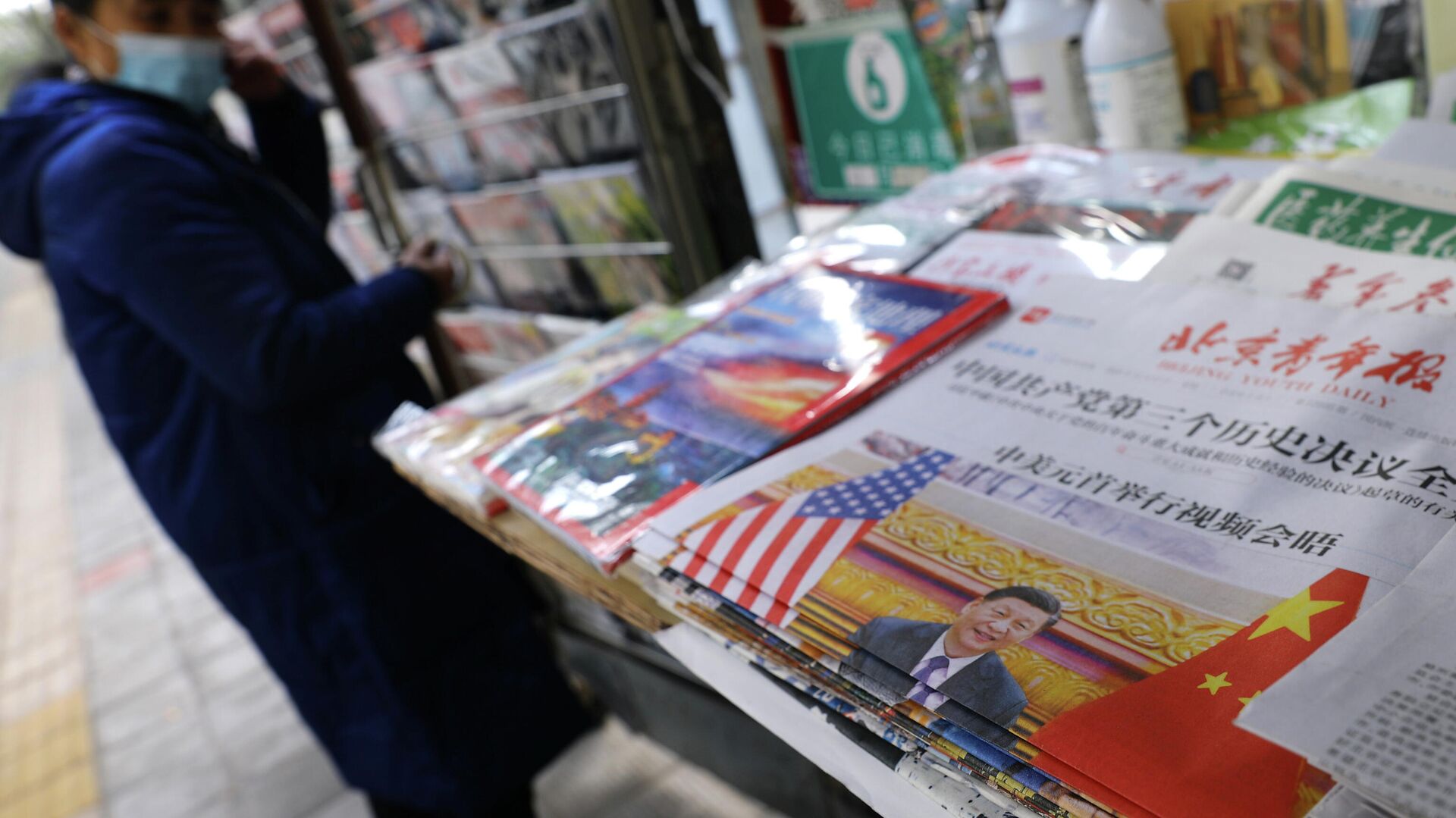https://sputnikglobe.com/20211118/biden-xi-temporarily-reduce-tensions-but-no-progress-on-taiwan-south-china-sea-analyst-says-1090814832.html
Biden, Xi Temporarily Reduce Tensions But No Progress on Taiwan, South China Sea, Analyst Says
Biden, Xi Temporarily Reduce Tensions But No Progress on Taiwan, South China Sea, Analyst Says
Sputnik International
WASHINGTON (Sputnik) – Presidents Joe Biden of the United States and Xi Jinping of China reduced bilateral tensions in their virtual summit but made no... 18.11.2021, Sputnik International
2021-11-18T02:52+0000
2021-11-18T02:52+0000
2023-06-19T12:43+0000
joe biden
opinion
china
arms race
meeting
hostility
aukus
us
xi jinping
taiwan
https://cdn1.img.sputnikglobe.com/img/07e5/0b/12/1090816030_0:161:3071:1888_1920x0_80_0_0_17465d924f7cda5d0ca80a330f044c4e.jpg
Biden and Xi held a 3.5-hour virtual summit on Monday night Washington time (on Tuesday in Beijing). During the meeting, the two discussed further development of US-China bilateral relations, their positions on the Taiwan issue and a "new Cold War" and also discussed Iran, North Korea, Afghanistan and the COVID-19 pandemic.The parties agreed that the meeting was "candid, constructive, substantive and productive," according to the Chinese Foreign Ministry.Glass Half FullThe two leaders’ conversation generated both good news and bad news, Five College Peace and World Security Program Director Professor Michael Klare observed.However, the two presidents failed to agree on steps to resolve any of the most divisive issues in US-China relations, such as Taiwan, the South China Sea, and human rights, Klare acknowledged."That's the half-empty part," he said.At its best, the Biden-Xi talks set the stage for more constructive dialogue on some issues, such as trade and climate change, where the interests of the two countries overlap, Klare advised.Nevertheless, the meeting established a new precedent with both sides showing their willingness to participate in constructive dialogues to prevent tensions between them escalating dangerously, Klare noted."I do think the dynamic has been changed, in the sense that both leaders implicitly acknowledged that without some degree of dialogue and compromise, relations between the United States and China could ‘veer into conflict,’ as Biden put it, resulting in a major conflagration that neither seeks," he said.Short of DetenteHistorian and anti-nuclear campaigner Joseph Gerson agreed about the importance of creating a new dialogue track at the highest level between Washington and Beijing.Gerson pointed out that Xi also proposed talks and cooperation with the United States on economic, energy, military, educational, technological, cyber and environmental protection."Let’s do what we can to bring this Chinese dream into reality, where it would contribute to strategic stability amidst what Biden euphemistically terms the great powers ‘intense competition'," he said.Even so, the current confrontational alignments of the United States and its allies in the QUAD (US-India-Australia and Japan) and new AUKUS (Australia-United Kingdom-US) against China could still in the long run prove to be more dangerous than the Cold War, Gerson warned.Serious tensions were also being generated by what Gerson described as "the toxic Washington consensus" that China now posed an existential threat to the United States and that therefore the current US-led global system must be defended at all costs, the analyst said.Embedded HostilityThis growing embedded hostility toward China in Washington was also reflected in the failure to hold any major commemoration of the American pilots, known as the "Flying Tigers," who 80 years ago helped to defend China against Japanese invasion and occupation, political commentator Professor John Walsh said.Walsh also noted the contrast between Xi’s appeal to Biden’s status as a friend and the chilly official response that the Chinese leader received from the White House.US National Security Adviser Jake Sullivan said on Tuesday that the US and Chinese leaders had discussed the necessity for nuclear strategic stability and arms control talks.However, China has no comments on that subject, Beijing Foreign Ministry spokesperson Zhao Lijian said on Wednesday.
https://sputnikglobe.com/20211117/calling-americas-bluff-xi-biden-talks-confirmed-true-extent-of-us-ambiguity-on-taiwan---analyst-1090809827.html
china
taiwan
Sputnik International
feedback@sputniknews.com
+74956456601
MIA „Rossiya Segodnya“
2021
Sputnik International
feedback@sputniknews.com
+74956456601
MIA „Rossiya Segodnya“
News
en_EN
Sputnik International
feedback@sputniknews.com
+74956456601
MIA „Rossiya Segodnya“
Sputnik International
feedback@sputniknews.com
+74956456601
MIA „Rossiya Segodnya“
joe biden, opinion, china, arms race, meeting, hostility, aukus, us, xi jinping, taiwan
joe biden, opinion, china, arms race, meeting, hostility, aukus, us, xi jinping, taiwan
Biden, Xi Temporarily Reduce Tensions But No Progress on Taiwan, South China Sea, Analyst Says
02:52 GMT 18.11.2021 (Updated: 12:43 GMT 19.06.2023) WASHINGTON (Sputnik) – Presidents Joe Biden of the United States and Xi Jinping of China reduced bilateral tensions in their virtual summit but made no progress on the most divisive issues between them, such as Taiwan and the South China Sea, analysts told Sputnik.
Biden and Xi held a 3.5-hour virtual summit on Monday night Washington time (on Tuesday in Beijing). During the meeting, the two discussed further development of US-China bilateral relations, their positions on the Taiwan issue and a "new Cold War" and also discussed Iran, North Korea, Afghanistan and the COVID-19 pandemic.
The parties agreed that the meeting was "candid, constructive, substantive and productive," according to the Chinese Foreign Ministry.
The two leaders’ conversation generated both good news and bad news, Five College Peace and World Security Program Director Professor Michael Klare observed.
"I would say it's a matter of a glass half full and half empty," Klare said. "Biden and Xi managed to ratchet down the tensions between the two countries, which had been getting extremely tense in the weeks leading up to the virtual summit. They also set the foundation for future progress on some issues, such as climate change and trade. That's the half-full part."
However, the two presidents failed to agree on steps to resolve any of the most divisive issues in US-China relations, such as Taiwan, the South China Sea, and human rights, Klare acknowledged.
"That's the half-empty part," he said.
At its best, the Biden-Xi talks set the stage for more constructive dialogue on some issues, such as trade and climate change, where the interests of the two countries overlap, Klare advised.
However, "Both leaders were very adamant in asserting their core interests - with China showing no flexibility on Taiwan and the US showing no flexibility on the South China Sea - so it is unclear whether further progress is possible on the most contentious issues," he said.
Nevertheless, the meeting established a new precedent with both sides showing their willingness to participate in constructive dialogues to prevent tensions between them escalating dangerously, Klare noted.
"I do think the dynamic has been changed, in the sense that both leaders implicitly acknowledged that without some degree of dialogue and compromise, relations between the United States and China could ‘veer into conflict,’ as Biden put it, resulting in a major conflagration that neither seeks," he said.
Historian and anti-nuclear campaigner Joseph Gerson agreed about the importance of creating a new dialogue track at the highest level between Washington and Beijing.
"Although it was short of signaling a new détente, we briefly exhaled when Biden and Xi met virtually [and] finally began to create what they termed ‘guardrails’ against their provocative and increasingly dangerous … confrontations from escalating to armed and potentially nuclear conflict," he said.
Gerson pointed out that Xi also proposed talks and cooperation with the United States on economic, energy, military, educational, technological, cyber and environmental protection.
"Let’s do what we can to bring this Chinese dream into reality, where it would contribute to strategic stability amidst what Biden euphemistically terms the great powers ‘intense competition'," he said.
Even so, the current confrontational alignments of the United States and its allies in the QUAD (US-India-Australia and Japan) and new AUKUS (Australia-United Kingdom-US) against China could still in the long run prove to be more dangerous than the Cold War, Gerson warned.
"Think about the disturbing similarities to the period leading up to World War I: tensions between rising and declining powers [and] complex alliance structures. Today, this includes AUKUS and the QUAD, intense nationalism with attendant hatreds, territorial disputes [and] arms races," he said.

17 November 2021, 18:39 GMT
Serious tensions were also being generated by what Gerson described as "the toxic Washington consensus" that China now posed an existential threat to the United States and that therefore the current US-led global system must be defended at all costs, the analyst said.
This growing embedded hostility toward China in Washington was also reflected in the failure to hold any major commemoration of the American pilots, known as the "Flying Tigers," who 80 years ago helped to defend China against Japanese invasion and occupation, political commentator Professor John Walsh said.
"Even as the two leaders met virtually, another meeting was taking place in Beijing, commemorating the Flying Tigers. However, there was no such friendly commemoration in Washington, simply more of the hostile rhetoric from across the narrow slit defined as the American political spectrum," he said.
Walsh also noted the contrast between Xi’s appeal to Biden’s status as a friend and the chilly official response that the Chinese leader received from the White House.
"The Chinese leader said he was pleased to see his 'old friend' Biden, though White House press secretary Jen Psaki had said before the meeting that Biden did not view Xi in such terms," he said.
US National Security Adviser Jake Sullivan said on Tuesday that the US and Chinese leaders had discussed the necessity for nuclear strategic stability and arms control talks.
However, China has no comments on that subject, Beijing Foreign Ministry spokesperson Zhao Lijian said on Wednesday.


